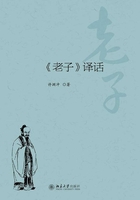第十二章 论声色
上一章谈“有”和“无”,举的例子是车轮、陶器、房屋,都是物。这一章举的例子却是人,是人的欲望。开始说:“五色令人目盲,”说色彩斑斓,令人眼花缭乱;“五音令人耳聋。”说声音嘈杂,震耳欲聋;“五味令人口爽,”说酸甜苦辣,令人食而不知其味。总之,声色味都使人不得清静。这三句的译文举例如下:
1.The five colors may confuse the eye;the five sounds may deafen the ear;the five tastes may spoil the palate.(高等教育出版社)
2.Too much color dazzles the eyes;too much music deafens the ear;too much eating and drinking destroys the appetite.(世界图书出版公司)
第一种是直译,第二种是意译,可能意译更好理解。
下面接着说:“驰骋畋猎,令人心发狂。”这就是由静而动。由外而内,说到骑马打猎,弯弓射箭,令人心狂意乱,一发不可收拾。又说:“难得之货,令人行妨。”这又由人及物,谈到金银财宝,引起贪欲,产生贪污行为,妨碍做人的品德了。这两句有几种译文:
1.Riding and hunting make man wild with excitement;rare goods goad man into stealing.(北京大学出版社)
2.Chasing and hunting may madden the mind;rare goods can lure the heart(tempt people to rob and steal).(辽宁大学出版社)
3.Overindulging in hunting drives you crazy, and coveting too much material things tarnishes your conduct.(世界图书出版公司)
“驰骋畋猎”第一、二种都是直译,第三种理解为“纵情畋猎”却是意译。“令人心发狂”第一种译文最好,第二种接近直译。第三种用词略重。“令人行妨”妁译文各不相同:第一种说煽动人去盗窃,第二种用了“引诱”或“诱惑”,第三种说贪图非分之财会玷污人的品行。可以说是百花齐放,各有千秋。
最后的结论是:“是以圣人为腹不为目,故去彼取此。”这就是说,圣人治国,只要人民丰衣足食,安居乐业,不要沉湎于声色犬马之乐。这就是老子清静无为的治国思想。结论的几种译文如下:
1.Thus the sage does not satisfy his eyes with colors but satisfy his stomach with enough food(governs his people by attending to their stomachs, not their senses).He discards the former and takes the latter(rejects one and accepts the other).(北京大学出版社,辽宁大学出版社)
2.Therefore, the sage is only interested in not suffering from
hunger or starvation, but not in physical pleasures.In accordance, you should fend off material temptation and be content to live a simple life.(世界图书出版公司)
第一种译文是直译意译并用,第二种主要是意译。老子静心寡欲的思想在中国历史上起了一定的作用,但却阻碍了经济的发展。
